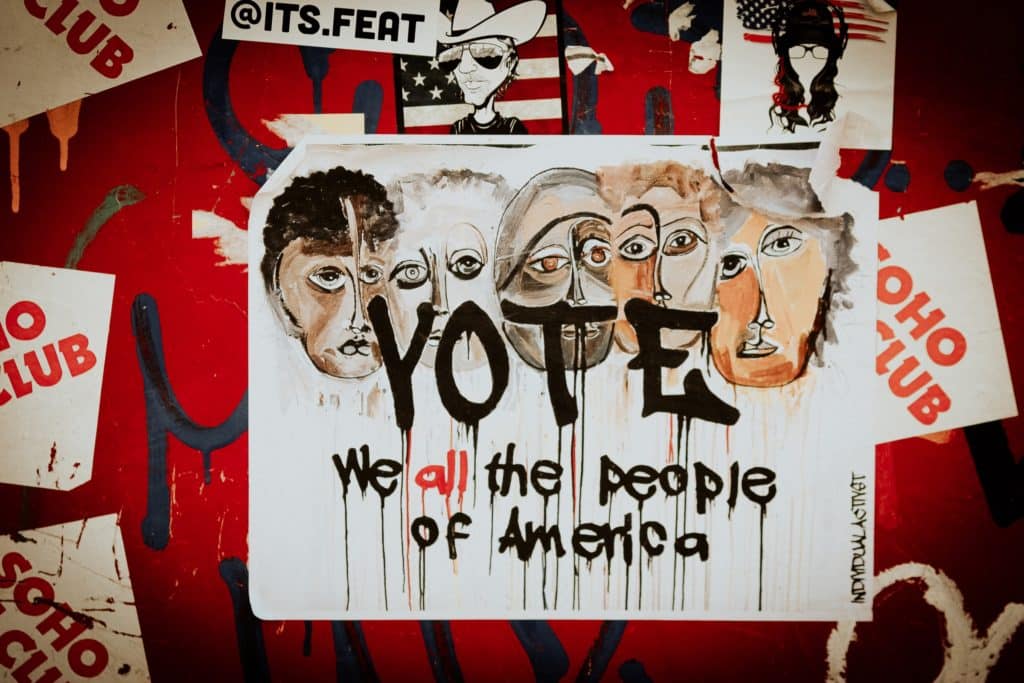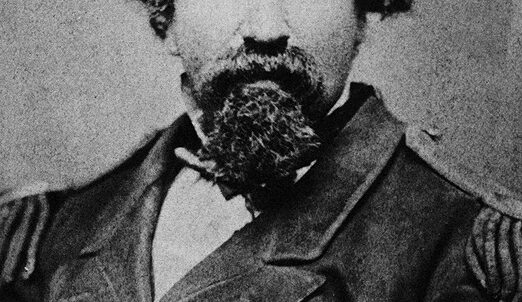
Photo by Jon Tyson on Unsplash
Toward a More Perfect Union? Exploring the 2020 US Elections
What did the 2020 US elections mean to you? What did they say to you about our prospects for forming a more perfect union? What lessons might we draw for reweaving our society after the elections, revitalizing our democracy, and moving toward a more perfect union?
These were the key questions we explored in a November 5, 2020 online community conversation, convened and facilitated by the Interactivity Foundation in partnership with IONA Senior Services. This was an exploratory discussion, one where participants were asked not only to bring forward their own perspectives, but also to help each other delve into divergent perspectives in a spirit of generosity. You’ll find a summary of some of the key points below. In light of the rich material we discussed, the Interactivity Foundation may move forward with this topic as a new online community conversation series in the new year (watch this space). This Community Conversation was part of the #WeavingCommunity initiative.
What concerns rose to the surface surrounding the election and about our prospects for forming a more perfect union?
Concerns about elections and the health of our democracy
- Voter suppression is going on in our country
- Our electoral process is dysfunctional
- The election process revealed how weak and fragile our democratic system is
- The election mechanics actually worked
- It’s a victory that there was no violence at the polls
- Locally lots of apparent voter engagement—with lots of participation via early voting
- It’s an illusion that our democracy is working
- We have structural problems in our system that weaken our representative democracy
- We always say, “it’s the most important election” or “democracy hangs in the balance,” but are those just exaggerations?
- We have governmental leadership with no moral compass—as long as they win, they can do whatever they want—and our democracy can’t survive more of that
- Another real threat to democracy: politicizing the federal civil service, turning government agencies to partisan purposes
- People in government should be public servants, not pursuing their own gain
Concerns about polarization
- We are divided more than ever, with high degrees of polarization and antipathy toward one another
- The division has become more extreme in the last few years
- We live in bubbles and don’t understand people outside of our bubble
- This high degree of polarization threatens our ability to self-govern
- We have always been polarized, so it’s not worse than before
- We have powerful myths of a national unity that never existed and we use this to cover up our history of exploitation
- We mostly ignore divisions because they often only impacted others (if we’re protected by our race or class, we can ignore the history of oppression of targeted groups within our country)
- We have to remember that America was built on exploiting others
- If you don’t live in middle class white America, you are more at risk and don’t want to reach out to those who want to keep you down, especially if you’ve been a victim of a hate crime
- If a major political party has become a party of white nationalism, how can you ask people to come together with them or split the difference by compromise?
- We have divisions, but most people are reasonable and just trying to get on with their lives
- Lately it has become riskier to have political discussions across partisan divides—it used to be fun, but now you risk losing relationships if you discuss politics
- Our divisions are so strong, it is hard to believe we can come together as one nation
- Our divisions are so fraught, they can’t even have discussions about the election in school
- We are a country divided on values
- Our divisions have religious roots, part of the evangelical right taking over the Republican party
- Religion can also be a source of values that can unite us and help us to bridge divides
- There’s a strong political movement to disregard facts, evidence, or science, which makes governance lose touch with reality
- You can’t come together with people who are being dishonest or hateful
- We have urban-rural divides
- In urban areas, people often have more experience with diversity and are more accepting of differences
- Trump and Trumpism seem like both cause and effect—a symptom of a widespread illness in our body politic
- Some people are behaving like spoiled children
Concerns about the role of media
- We live in different media bubbles, so we don’t know how others see the world
- Media shapes reality—we can’t understand the reality perceived by those in the other camp
- One branch of media presents an “alternate reality” that is not clearly connected to ascertainable facts, which makes it difficult, or nearly impossible, to reason with its devotees
- One political party regularly attacks the news media and other evidence-based approaches, like science
- We need to be wary of the outsized role that social media plays in our public discourse
- Popular media are driven by controversy and sensationalism rather than focusing on what’s essential
- The news media focuses more on entertainment than on genuinely informing the public
- We live in a celebrity culture, where everybody wants a chance to be a celebrity, to be popular
How might we move toward a more perfect union?
- We need democratic reform to make policy responsive and accountable to the broad public will
- If government responds to the public will and does good things to improve people’s lives, then polarization will lessen and people will have greater trust in government
- The election of a new government is a start—but we need to update our constitution to bolster our democracy and make it more representative of the popular will
- We need leadership from the top to advocate unity with our political opponents
- We should celebrate genuine public servants—those truly acting in the public interest (not their private interests)
- We need to restore or embody greater civility at all levels of governance and society
- We need to find opportunities for conversation with people from the other side (it’s not important to agree, but to talk with people with whom we disagree)
- We need to teach the value of having discussions across our divides
- We need to learn how to listen first to each other—not to talk first, but to listen first to others
- We need to get past labels and attend to the substance of what people are saying
- We need to strive to find the good in what opponents say or do
- We need to recognize the universal needs that we share: we are all equally human
- We need to find shared values to connect across differences
- It’s not a matter of having the right facts, it’s about finding shared values to connect better with others
- It’s best to avoid direct confrontation on hot issues—seek conversations about values
- We need to be honest with one another and truthful in our words and actions—we can’t just rely on happy talk and fake politeness
- We need to recognize that people on the other side are not all the same and are not all so hostile
- We should educate our children for a civic spirit that is bigger than our divisions, whether this starts in our families, in community organizations, or within schools
- We should raise the next generation to be more open to diversity—including diversity of viewpoints
- We need education to help make us antiracist
- We need to flip the media from entertainment to education
- We need education for media literacy
- We should change our media diet—to expose ourselves to different sides
- We need to reform or disband social media, because it just aggravates divisions and spreads disinformation
- What if we come together as one—to fight fascism?
- Time can heal us



